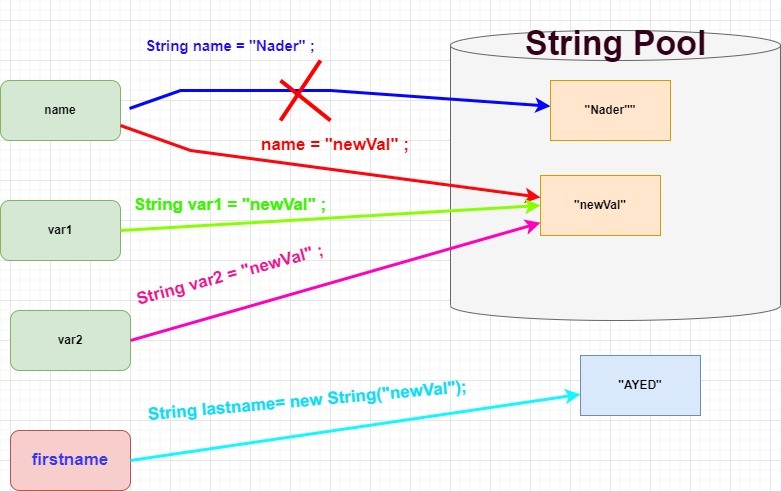Why Are Strings Immutable in Java? Insights into Memory Performance
Immutable Strings: A Trick Element in Ensuring Information Uniformity and Dependability
In the realm of information monitoring, the importance of unalterable strings can not be overstated. The idea of immutable strings goes beyond simple technicality; it is a cornerstone in the facility internet of information governance.
The Idea of Unalterable Strings
Unalterable strings, an essential idea in shows, refer to strings that can not be changed once they are developed. Fundamentally, once a string value is assigned, any kind of operation that shows up to modify the string actually creates a new string. This immutability ensures data consistency and dependability in applications, as it protects against unanticipated modifications to the original information.
Benefits in Data Uniformity

Information uniformity is crucial in numerous facets of software application development, including database management, multi-threaded settings, and dispersed systems (Why are strings immutable in Java?). Unalterable strings contribute considerably to accomplishing this uniformity by stopping data corruption as a result of simultaneous access. In circumstances where several procedures or strings communicate with the very same data at the same time, immutable strings function as a secure versus race problems and synchronization issues
Moreover, the immutability of strings simplifies debugging and testing processes. With immutable strings, designers can rely on that as soon as a string is established, it will certainly continue to be the same, making it easier to map the source of mistakes and ensuring that test cases create regular outcomes. This reliability in data taking care of inevitably brings about a lot more stable and robust applications.

Carrying Out Unalterable Strings
Making certain the immutability of strings calls for a thoughtful approach to their implementation in software application advancement. When a string object is created, one vital method is to create string classes in a means that protects against adjustments. By making strings immutable, developers can enhance data uniformity and dependability in their applications.
To carry out unalterable strings properly, developers must prefer creating new string things instead of changing existing ones. This method ensures that as soon as a string is assigned a worth, it can not be altered. Furthermore, any procedure that shows up to modify the string needs to create a new string with the desired modifications as opposed to changing the original.
In addition, utilizing unalterable strings can streamline concurrency administration in multi-threaded environments. Since unalterable strings can not be changed after production, they can be safely shared among several strings without the threat of data corruption.
Function in Dependability Guarantee
In software development, the utilization of immutable strings plays an important role in making sure the reliability of data operations. Immutable strings, as soon as created, can not be customized, ensuring that the data they represent stays consistent throughout the application's implementation. This immutability residential or commercial property provides a degree of assurance that the data being refined will not be inadvertently changed, bring about unanticipated end results or mistakes in the system.
By incorporating unalterable strings into software program style, designers can enhance the reliability of their applications by decreasing the dangers related to mutable data - Why are strings immutable in Java?. my link Immutable strings assist in avoiding information corruption or unintentional adjustments, which can be specifically go now critical when dealing with sensitive details or when data honesty is extremely important
Furthermore, the usage of immutable strings streamlines concurrent handling, as numerous strings can safely accessibility and share string data without the risk of one string changing the web content while one more reads it. This element adds substantially to the total integrity of the software application system, guaranteeing foreseeable and regular habits in data dealing with operations.
Applications and System Assimilation
The smooth integration of unalterable strings into different applications and systems is crucial for making sure durable data consistency and reliability throughout varied technical environments - Why are strings immutable in Java?. Immutable strings play an essential function in boosting the honesty of information exchanges and interactions within complicated software ecosystems. By integrating unalterable strings into applications, designers can reduce the threats associated with information meddling, unapproved alterations, and unintended alterations, thereby fortifying the overall safety and security posture of the system
In the context of system integration, unalterable strings act as a foundational aspect for developing secure communication networks and facilitating smooth information transfers in between various parts. Their unalterable nature makes sure that data transferred in between systems remains the same and verifiable, reducing the probability of disparities or mistakes that could endanger the stability of the whole system. Furthermore, unalterable strings can enhance interoperability between disparate systems by offering a standard layout for data depiction, making it possible for much more effective information processing and exchange procedures across interconnected platforms. By adopting unalterable strings in applications and system integration procedures, organizations can fortify their data framework and promote the dependability and uniformity of their information properties.
Final Thought
To conclude, unalterable strings play an important duty in keeping data uniformity and reliability in different applications and system assimilations. By Read More Here making certain that strings can not be changed once developed, the integrity of data is maintained, lowering the danger of variances and errors. Executing immutable strings can significantly improve the reliability of systems, eventually causing even more accurate and trustworthy information handling.
